Tripoli, 17 May:
Saif Al-Islam Qaddafi is refusing to appoint a lawyer to defend him against charges of torture and murder committed . . .[restrict]during last year’s uprising against his father’s 42-year rule.
In April, Saif insisted he wanted to defend himself in any trial, like the former Yugoslav leader Slobodan Milosevic at his trial in The Hague. It is not clear whether this latest refusal is consistent with that intention, or part of an attempt to disrupt efforts to begin his trial inside Libya. Libyan law forbids any criminal trial to take place where the defendant does not have legal representation.

Addressing the UN Security Council on Wednesday, Libya’s Deputy Ambassador to the UN, Ibrahim Dabbashi, said that Saif’s refusal to hire a lawyer would not obstruct the trial. “There are no obstacles towards hiring an attorney to defend him”, Dabbashi said.
This incident comes amid ongoing questions, mainly outside the country, about whether Libya can deliver a fair trial of Saif Qaddafi, and corresponding calls for any trial to be handled by the International Criminal Court (ICC) in The Hague.
Under the ICC’s own rules, it has no jurisdiction in a case unless the country where a crime took place cannot or will not try those involved. The latter is not in question: Libya clearly wants to put Saif on trial. It is now down to a question of ability. The ICC and its supporters say that Libya is not able to put Saif on trial, at least not a fair trial.
For its part, the Libyan government has repeatedly rebutted accusations that a fair trial cannot be conducted inside Libya and insists that Saif will be tried here.
Libya has yet to outline to the ICC how it intends to try Saif. If the ICC concludes that Libya cannot or will not give him a fair trial, and is not cooperating with the court, then it could theoretically refer Libya to the UN Security Council.
However, the ICC’s chief prosecutor Luis Moreno Ocampo has repeatedly hinted that the ICC will not object to the trial taking place inside Libya so long as the ICC is properly consulted and the trial can be shown to be free and fair.
[/restrict]







